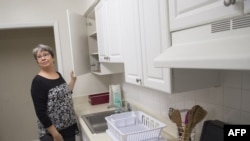The U.S. Department of Commerce is investigating the possible circumvention by Vietnamese suppliers of anti-dumping and anti-subsidy taxes on wooden kitchen and bathroom cabinets imported from Vietnam that used Chinese-made components covered under the U.S. tariff regime.
The department launched the probe after the American Kitchen Cabinet Alliance filed circumvention inquiry requests on April 22. The AKCA, a trade group representing U.S. wood-cabinet manufacturers, requested rulings on cabinets labeled “made in Vietnam.”
The department’s investigation, announced in the June 10 Federal Register, is looking into whether wooden cabinets from Vietnam and Malaysia include components imported to those countries from China.
If the final products exported to the U.S. are found to include Chinese components, the finished products would be subject to trade remedy measures such as taxes that the U.S. applies to similar products exported directly from China.
The Commerce Department will have to issue final conclusions within 300 days of launching its probe, although the investigation could be extended to conclude not more than 365 days after the launch, according to the website Vietnam News.
According to a spokesperson for the U.S. International Trade Commission, “This matter is before the Department of Commerce, and the commission does not comment on Commerce matters.”
Speaking at a recent conference on woodwork, Nguyen Pham Nhu Ha, of Vietnam’s Customs Control and Supervision Department under the General Department of Vietnam Customs, said that over the past few months, the department has seen a surge in woodwork exports to the United States, according to The Saigon Times.
Ha said some Vietnamese firms have imported veneer and plywood from China, then attached “Made in Vietnam” labels to the end product, while others have bought wooden parts from China for assembly in Vietnam and then exported the products as Vietnamese-made.
“Such a sophisticated circumventive trade method has taken customs authorities time to investigate and collect evidence,” Ha said.
In response to a request for comment by VOA Vietnamese, Vietnam’s Trade Remedies Department (TRAV) under the Ministry of Trade and Industry (MOTI) referred to statements on its websites saying that it recommended producers and exporters of wood cabinets study the U.S. anti-circumvention regulations and investigation procedures.
The Vietnamese authorities also asked the producers and exporters to fully comply with any U.S. requests to provide information while working with the TRAV.
Tran Quoc Thuan, a lawyer in Ho Chi Minh City and former deputy director of Vietnam’s Office of the National Assembly, told VOA Vietnamese that although Vietnam and the U.S. maintain a good relationship, the Vietnamese government and its exporters need to take this investigation seriously and review their practices of importing and exporting wood products.
Tran added that “the companies must abide by the laws as well, not only with wood companies but also businesses which import materials from countries that are deemed as hostile nations by the U.S.”
The U.S. issued an order to impose anti-dumping and anti-subsidy taxes on wood cabinets originating from China in February 2020 after the U.S. International Trade Commission in April 2019 determined that there was “a reasonable indication that a U.S. industry is materially injured by reason of imports of wooden cabinets and vanities from China that are allegedly subsidized and sold in the United States at less than fair value.”
The anti-dumping tax ranges from 4.37% to 262.18% while anti-subsidy tax rates can vary from 13.33% to 293.45%, according to the U.S. International Trade Administration.
The enforcement of U.S. trade law was a key focus of President Donald Trump’s administration during a trade war with China, according to the U.S. trade agency.
Since February 2020, as a result of the U.S. taxes, exports of wood cabinets from China to the U.S. have fallen by 54%, from $2.5 billion to $1.6 billion, according to Viforest, which represents wood companies in Vietnam. During the same period, Vietnamese exports of wood products to the U.S. increased by more than 130%, from $1.37 billion to $2.7 billion.
At the same time, imports of these products from China to Vietnam increased from $232 million to $810 million, according to the association as quoted by Woodworking Network.
Do Xuan Lap, CEO and president of Tien Dat Furniture and chairman of Viforest, told Vietnam’s Cong Thuong news website on June 13 that the U.S. investigation will harm Vietnam’s woodworking industry.
“If the investigation finds that Chinese-made components were part of Vietnamese cabinets exported to the United States, the U.S. will impose the same tariffs on the products from China,” he said.
According to Viforest, the U.S. market accounts for 68% of Vietnam’s export turnover and wood products.
After the U.S. imposed anti-dumping duties on Chinese-made kitchen cabinets and bathroom cabinets in 2020, U.S. buyers began ordering the items from Vietnam, where many Chinese factories were relocating, Do said.
Vietnam’s exports of wood and wood products to the U.S. were valued at $8.77 billion in 2021, an increase of 22.4% compared with $6.97 billion in 2020, according to Viforest.
In 2021, Vietnam’s total exports of wood and wood products were $14.8 billion, an increase of 19.7% compared with 2020 at $12.37 billion, according to Vietnam’s General Statistics Office.




